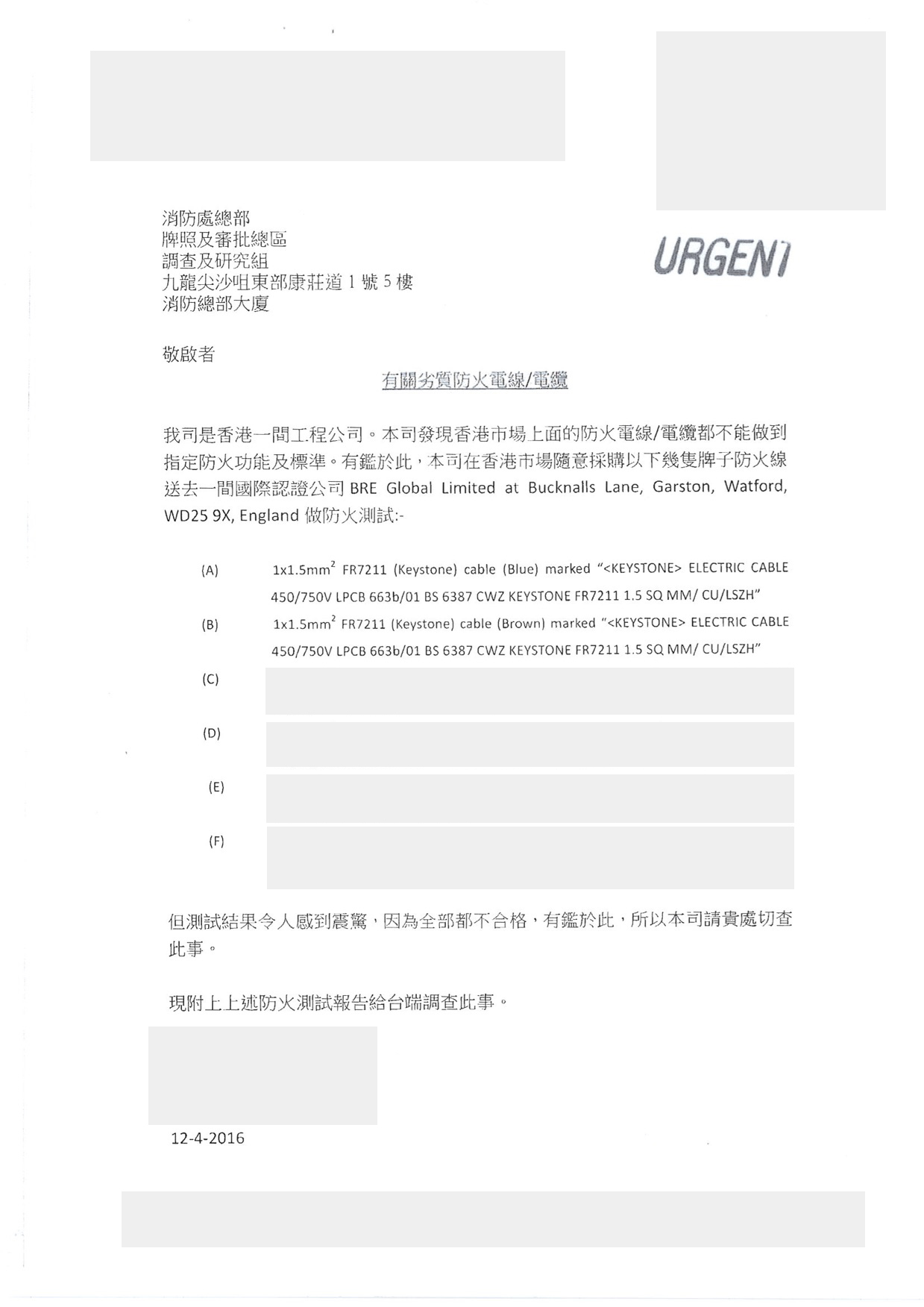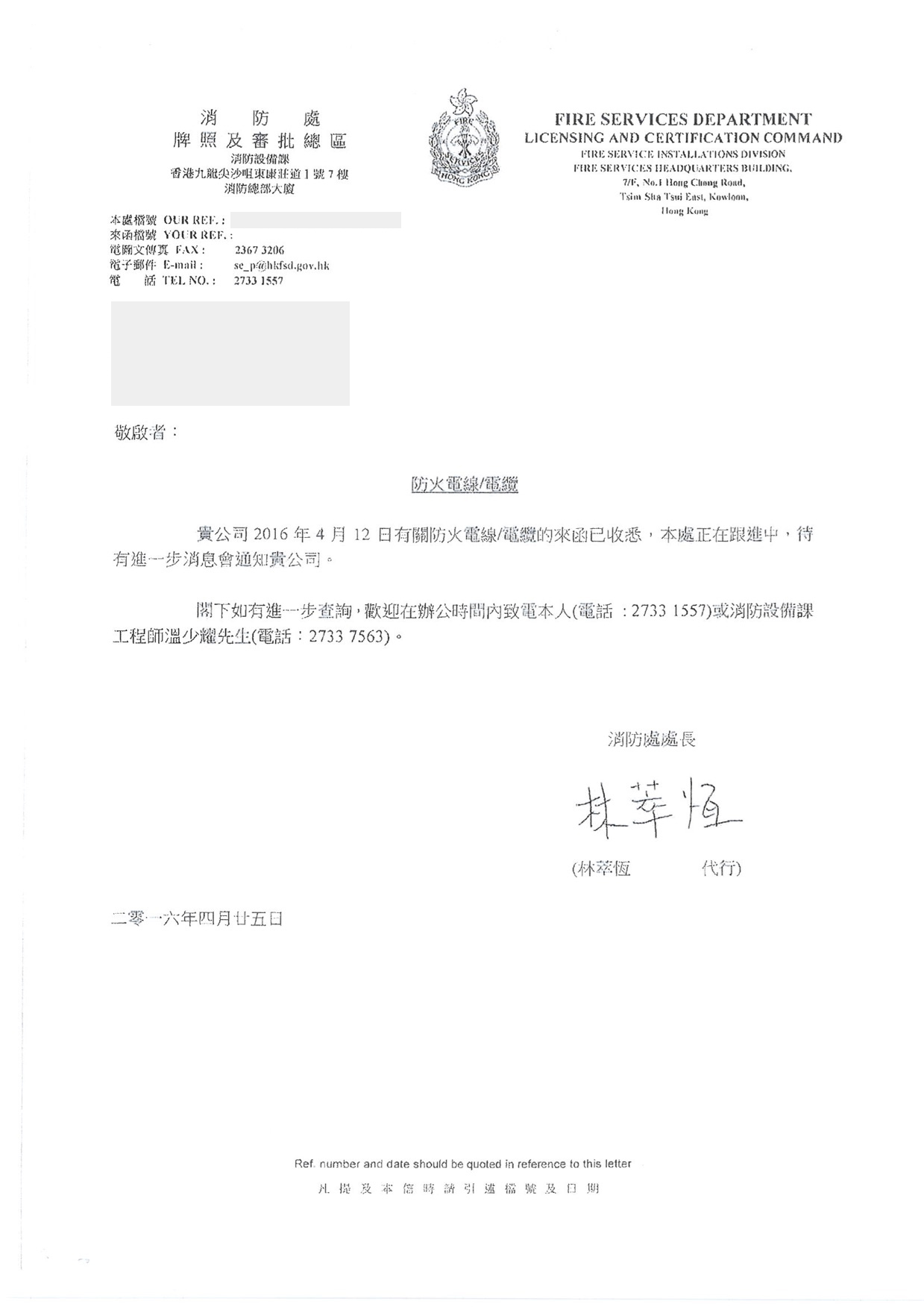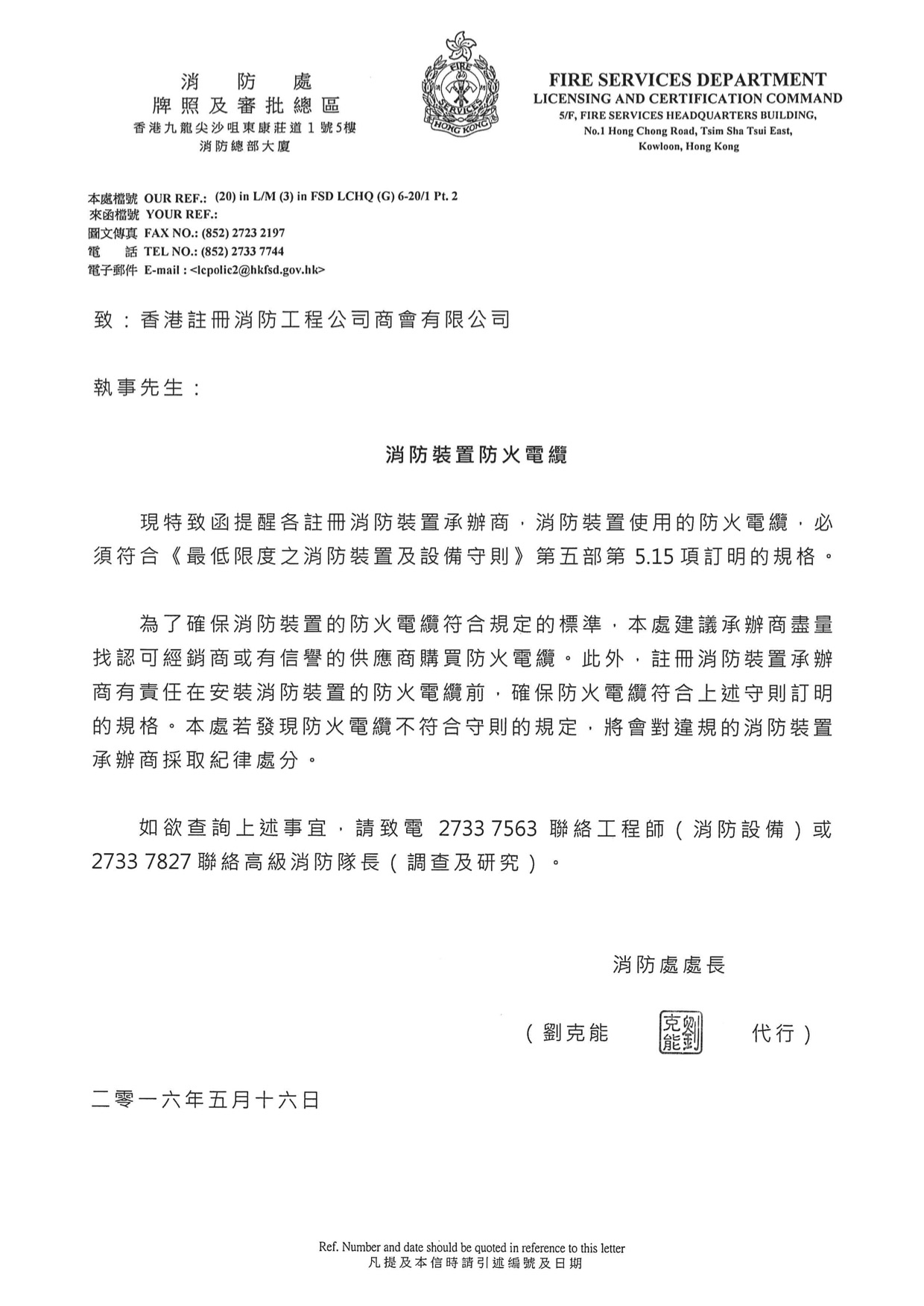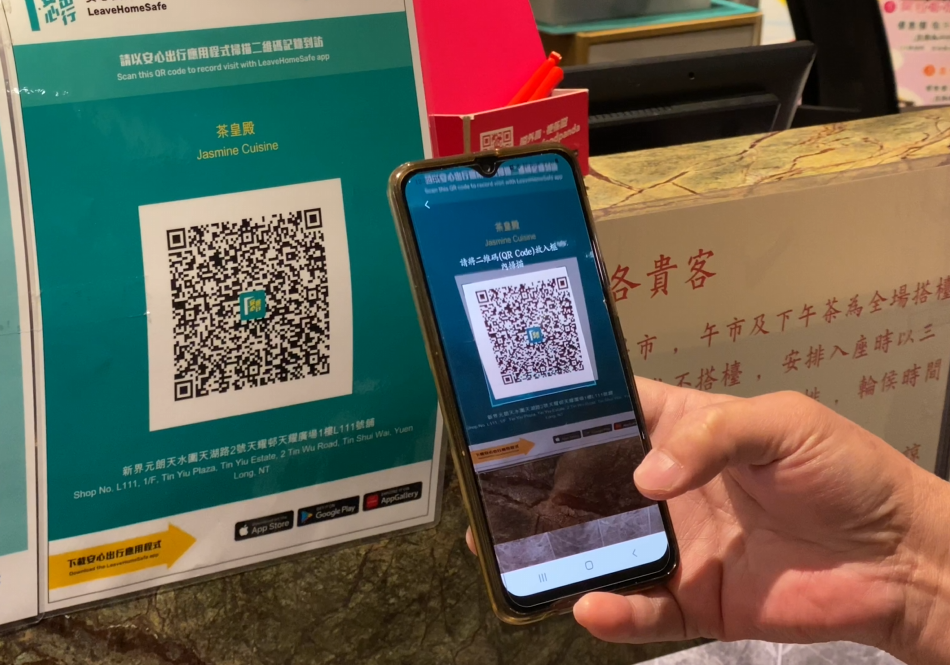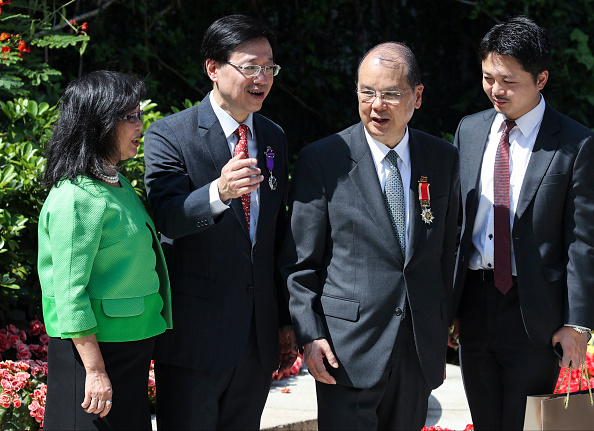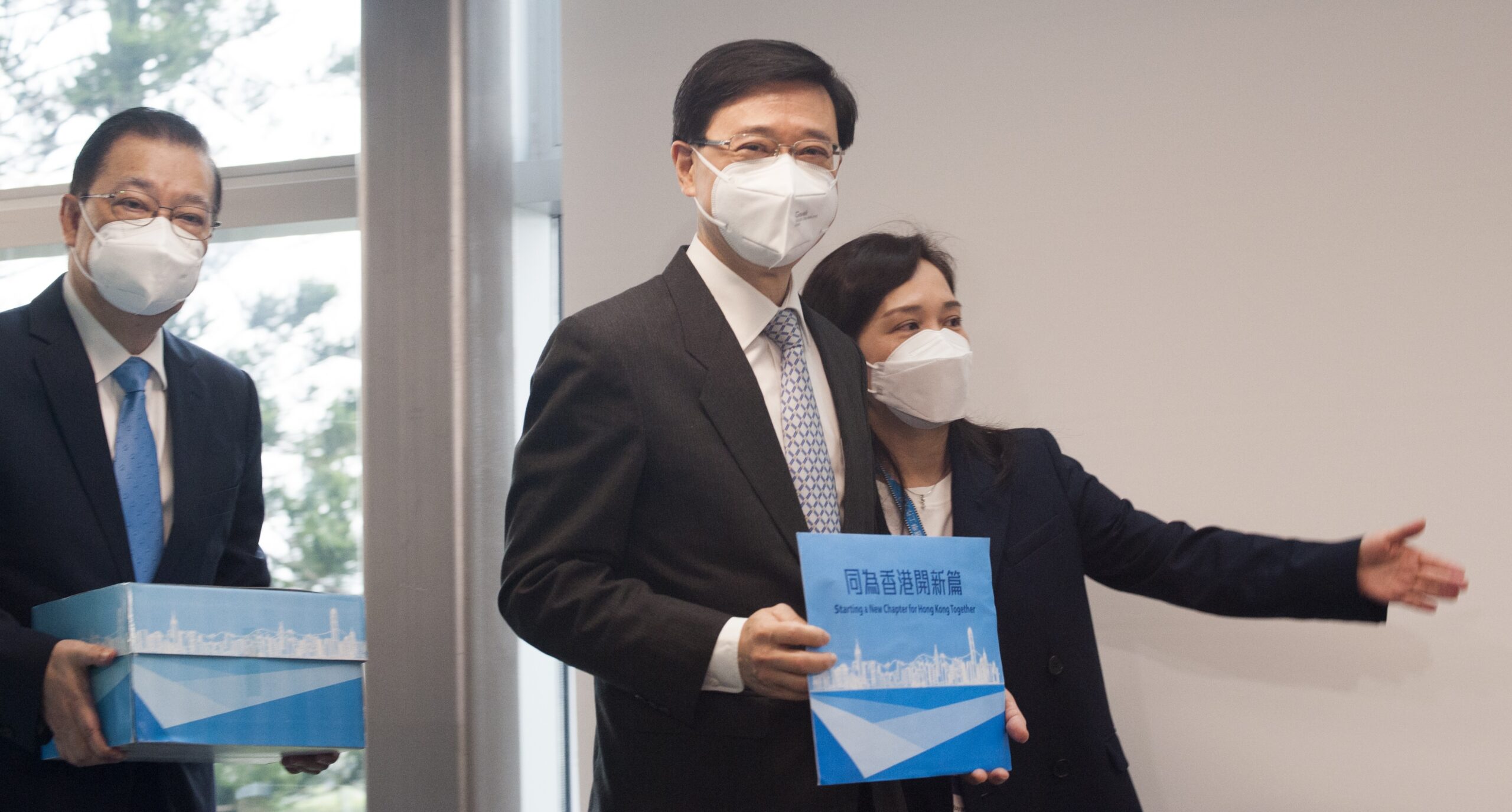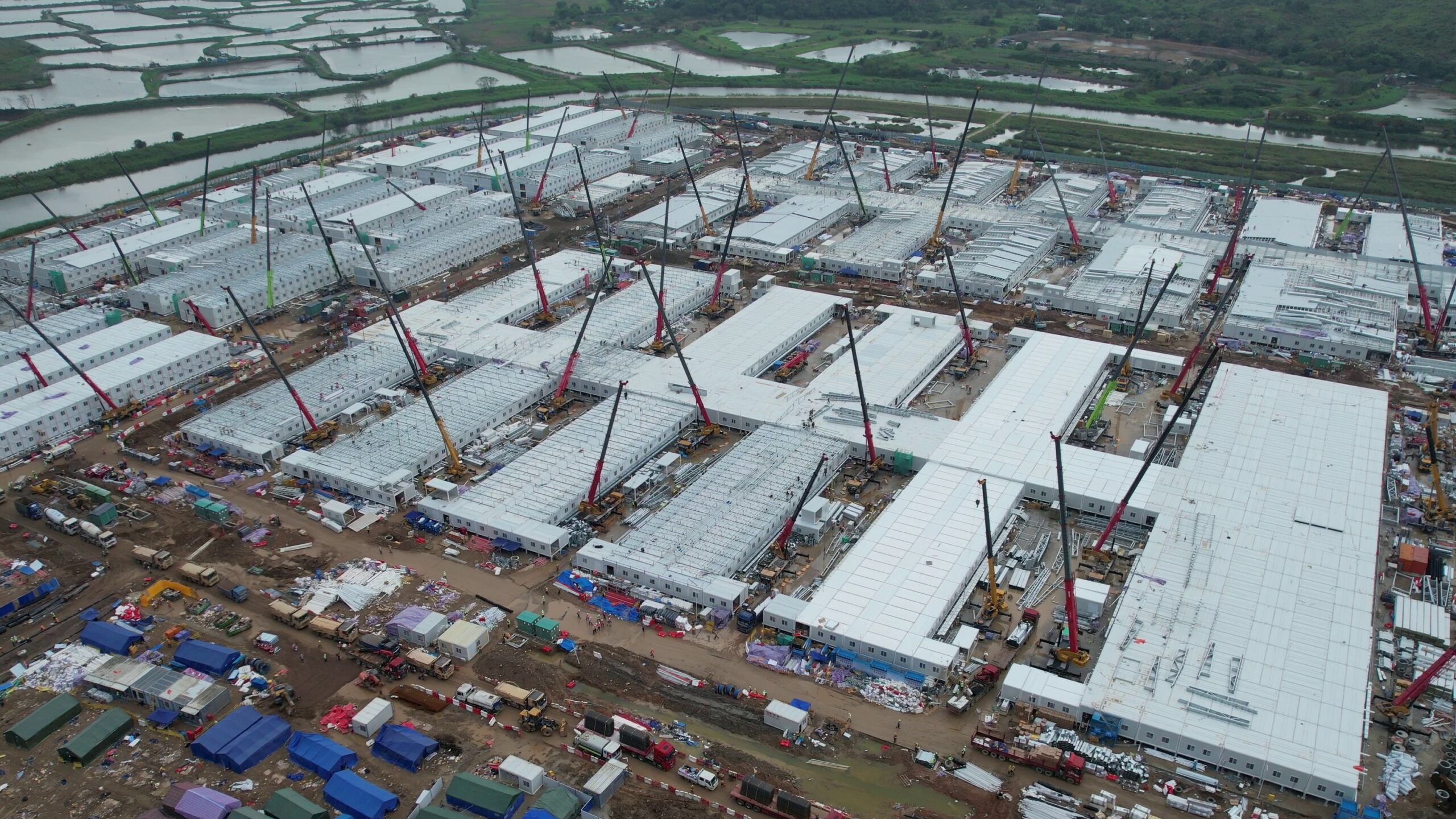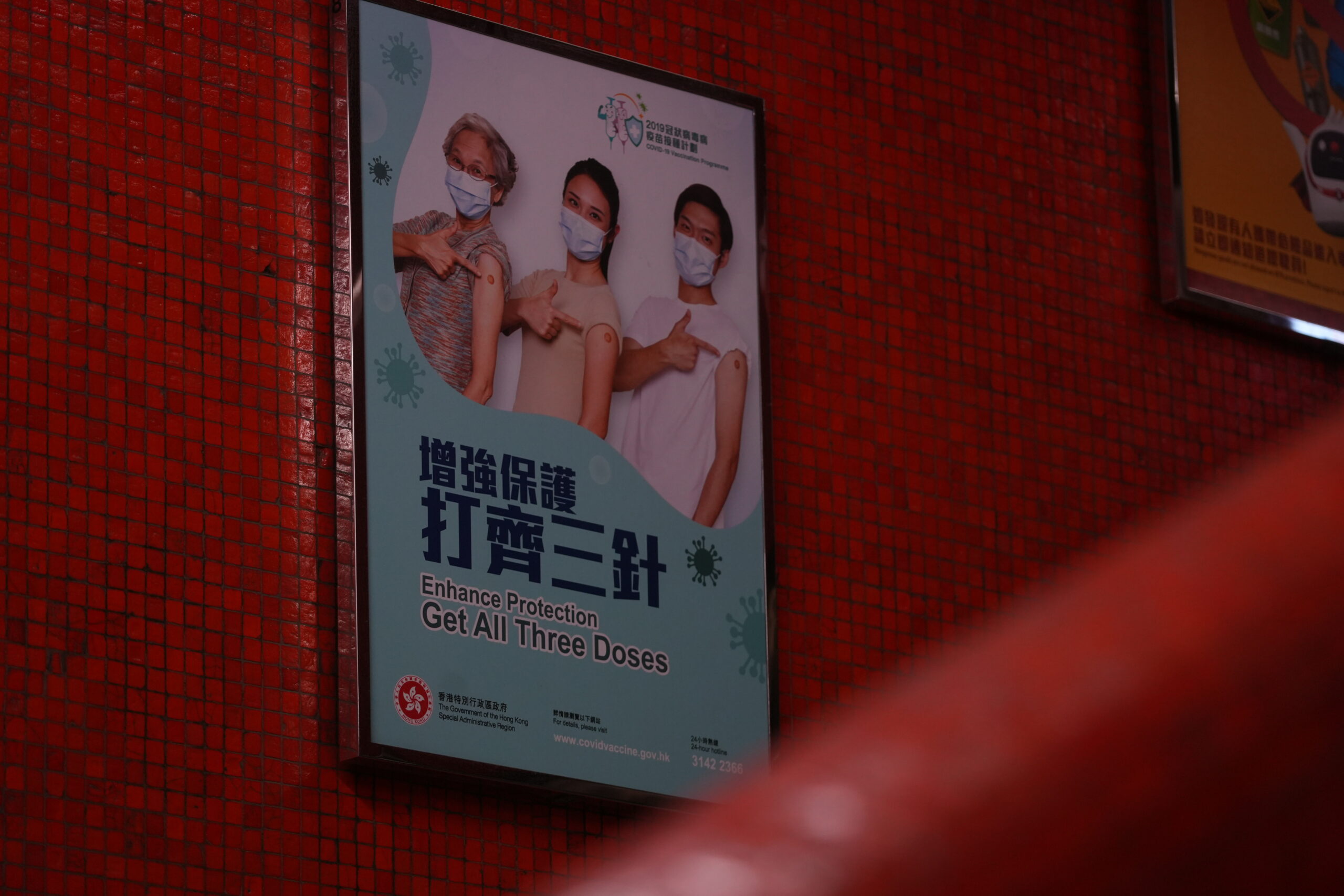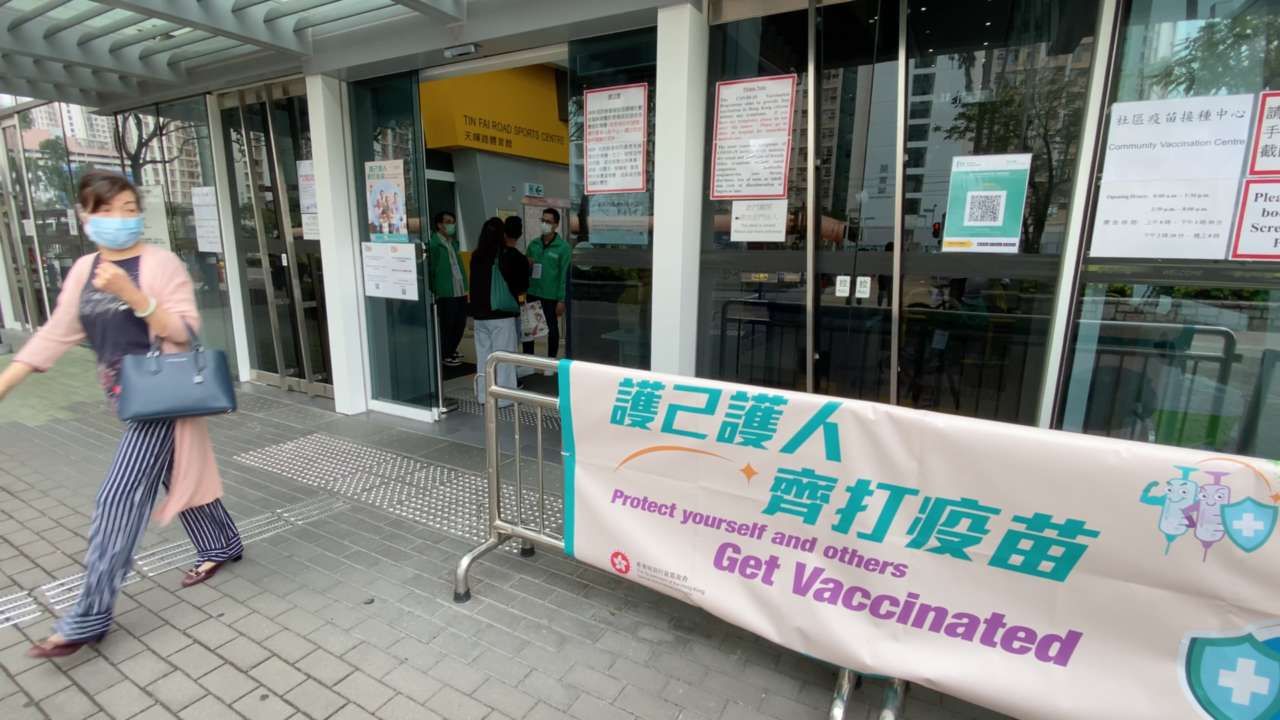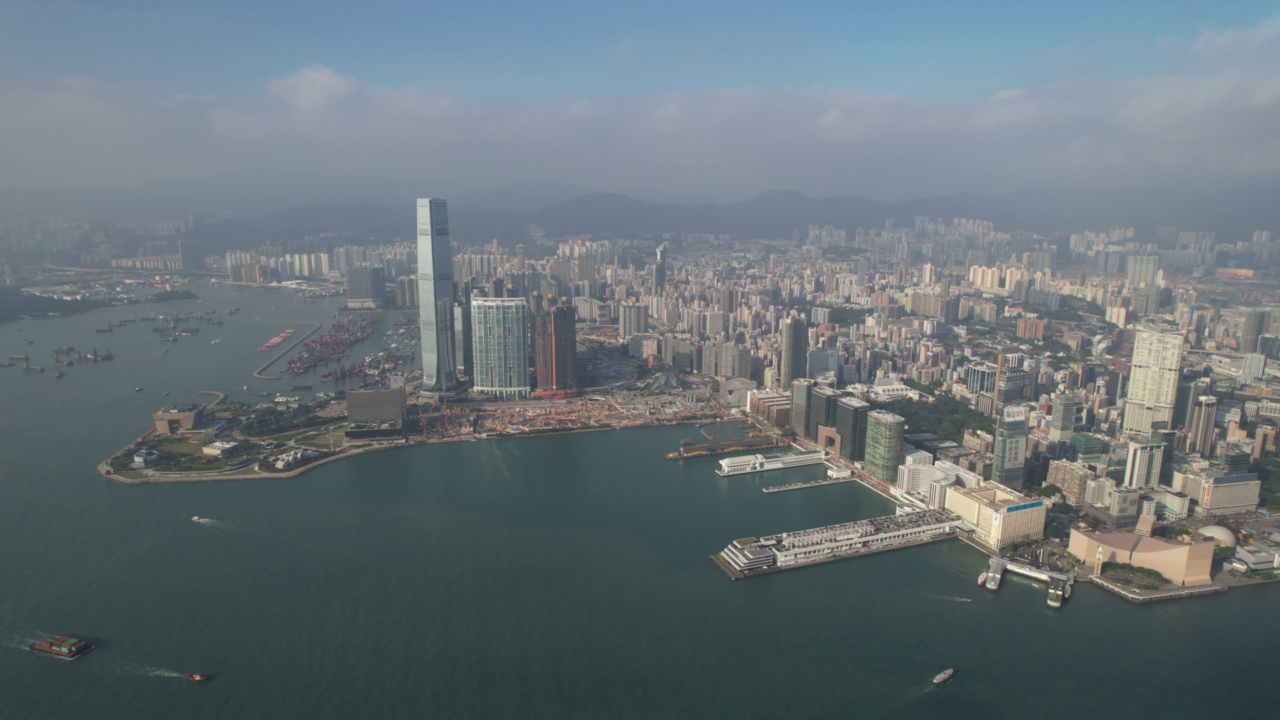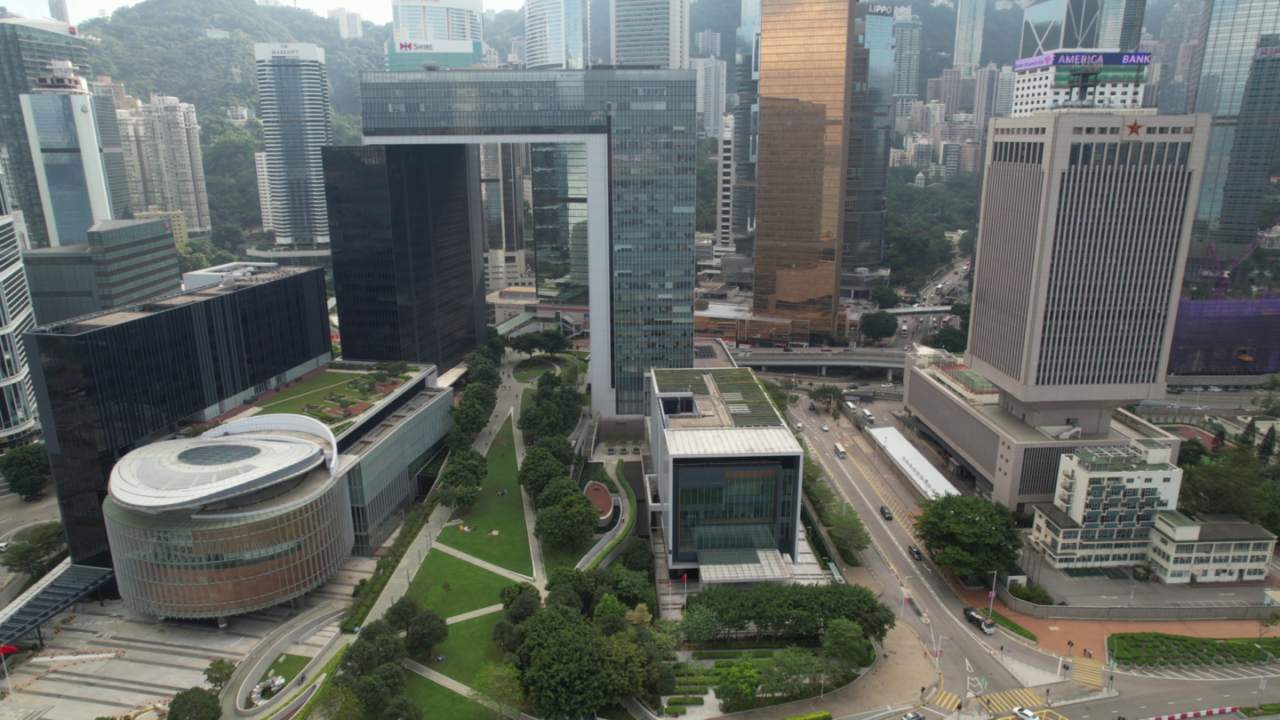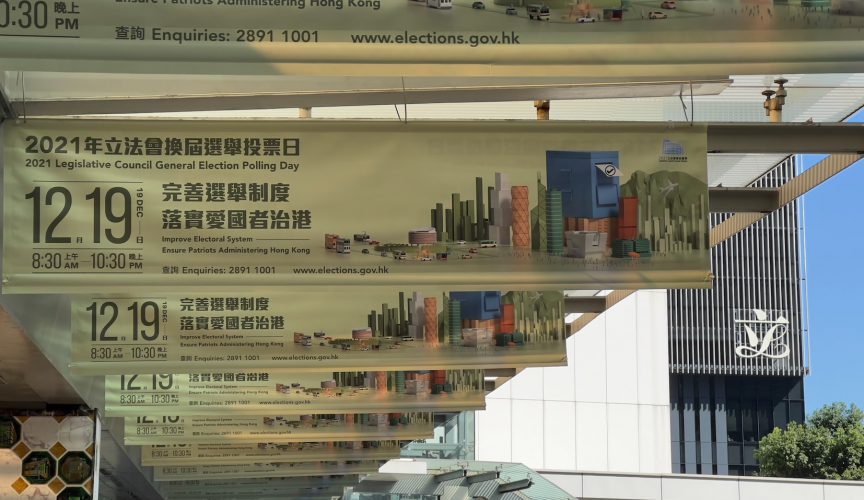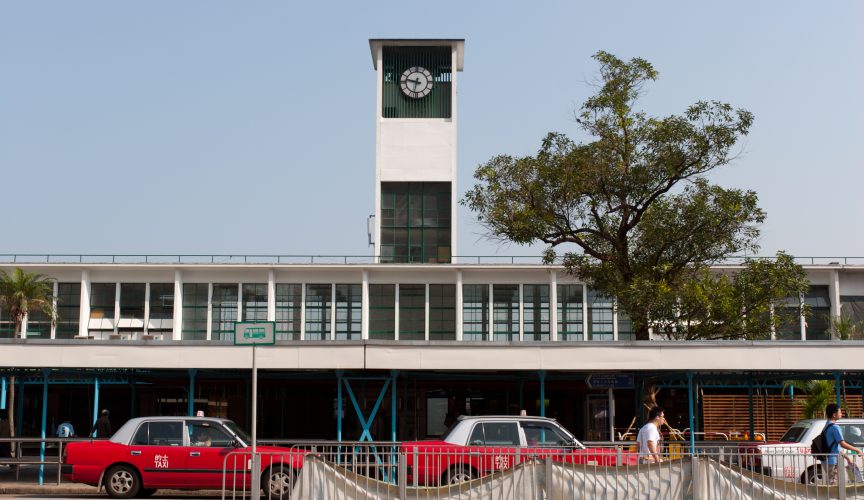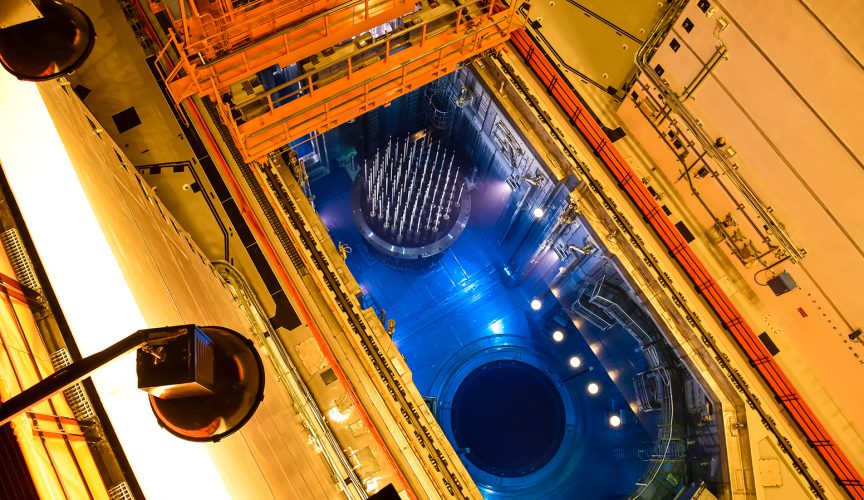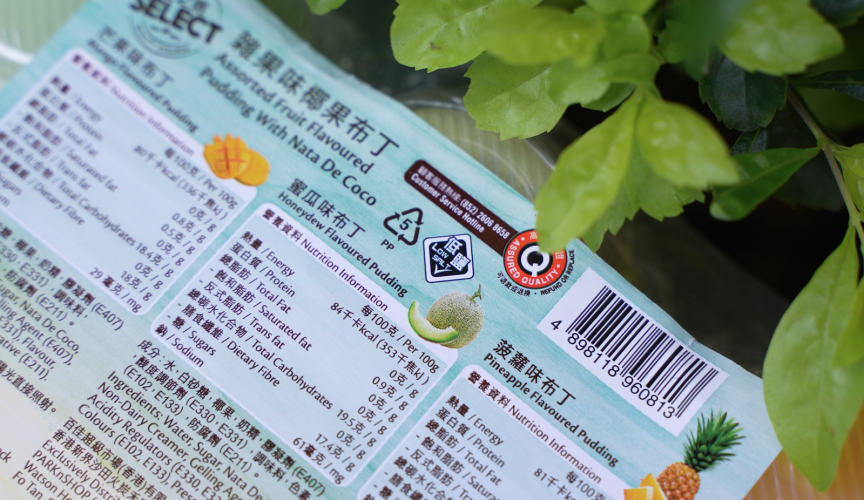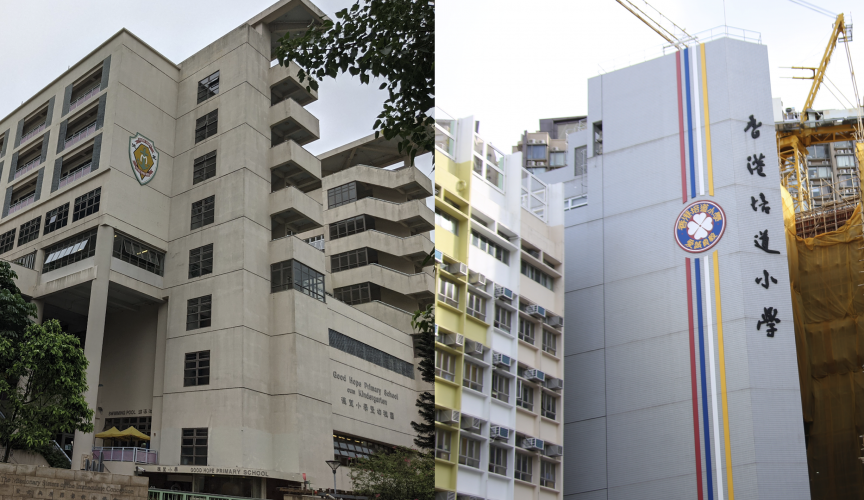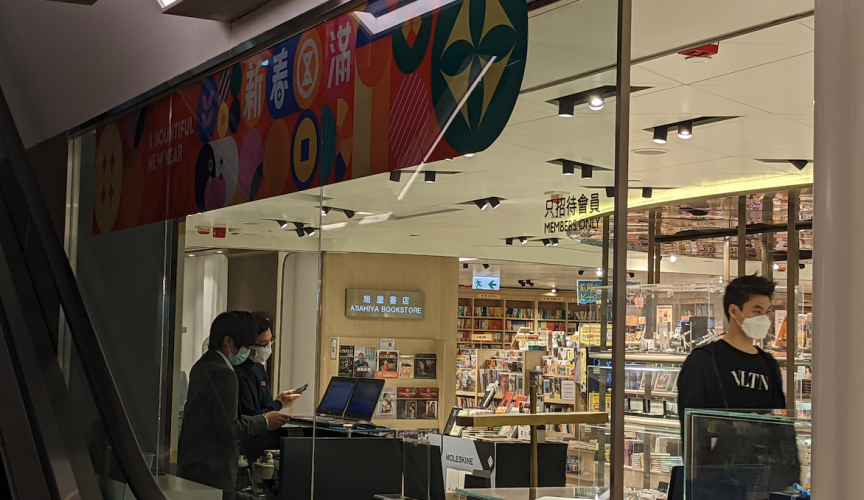Quality issues were long known to the industry and the government
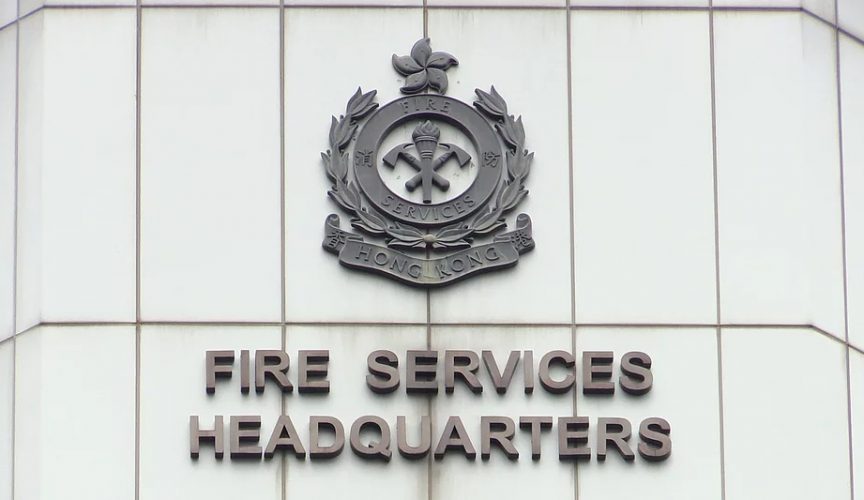
Fire-resistant cables failing to reach required standards was already known to the government and the industry. However, government departments such as the Fire Services Department (FSD) merely cross-checked the documents and has yet to follow-up and investigate.
FactWire’s earlier report on Tuesday showed that fire-resistant cables found in On Tat Estate in Kwun Tong are below standards, failing to supply electricity continuously under high temperature, and imposes fire safety risks. The manufacturer supplied its cables to a lot of infrastructure, government building, public housing and private development projects.
FactWire made an email enquiry to the FSD on April 21 at 3pm on fire-resistant cables failing to meet required standards, including whether there would be any follow-up action. No replies were received from the FSD until April 26. In the morning of April 26, FactWire again emailed the FSD on whether they received the complaints last year and urged them to reply. The FSD replied FactWire at 5:33pm yesterday, stating that ‘we are currently handling relevant matters and would reply as soon as possible’.
However, the FSD then held a press conference at 6pm, only extending invitations to certain media companies excluding FactWire, and issued an email reply to FactWire at around 8:30pm.
FSD Assistant Director (Licensing and Certification) Leung Kwun-hong admitted during a press conference on April 26 that the FSD received complaints about fire-resistant cables failing to meet required standards, and the department began investigation on the matter, including requesting the relevant suppliers to submit documents of certification. The documents are verified upon investigation, and the department therefore concluded that the complaints are unsubstantiated.
Emil Yu Chen-on, director and general manager of Keystone Electric Wire and Cable Co., Limited, the supplier concerned in the complaints, revealed to FactWire last week that the FSD and the Hong Kong Customs and Excise Department issued enquiries to Keystone, including making statements, yet they did not take samples for inspection.
The FSD expressed concern regarding the case of suppliers supplying fire-resistant cables failing to meet required standards again, and stated that they would follow up upon the case, including to cross-check the model number, test reports and certificates of the product submitted by contractors. Also, the FSD stated that they would not collect samples for inspection during the acceptance inspection procedure, and instead mainly rely on quality evaluation in the process of product certification conducted by certification bodies and applied by manufacturers. The FSD would continue the investigation by examining the relevant documents.
The complaint letters were directed to the FSD Licensing and Certification Command and investigative team and titled as ‘Regarding bad-quality fire-resistant wire or cables’ in Chinese on April 12 last year. The letters stated that the construction companies discovered that fire-resistant cables in the market failed to meet the required standards, and commissioned an international certification body to conduct testings on three brands, which included cables manufactured by main local supplier Keystone.
The letter stated that ‘the testing results were shocking because all cables failed the tests. We therefore urge the department to investigate upon the case’.
The FSD issued a reply on April 25, 13 days later, stating that ‘we have received your letter, and the department is following up on the case. We would inform you upon the matter once we have more information.’
However, sources from the electronics industry who provided FactWire with the letters said the FSD did not follow-up on the reply and instead issued a notice to the industry around 20 days later, stressing that the fire-resistant cables used for fire service installation must meet its required standards.
‘The complaints shocked the industry. Since it pointed to some popular brands, there may be quite a number of contractors and maintenance projects affected. We made no moves in the beginning to see whether the FSD would carry out investigations. A few months later, the FSD merely issued a short notice telling contractors to check the certificates, and everyone else was relieved and acted as if nothing ever happened, and proceeded to purchase products from the suppliers with the so-called certification,’ sources added.
The notice was found in the ‘FSI Contractors’ page of the FSD website. Titled as ‘Fire Resisting Cable for Fire Service Installations’ and issued on May 16 last year, the notice was directed towards ‘The Association of Registered Fire Service Installation Contractors of Hong Kong Ltd.’ and was written in around 200 words.
The notice mentions that ‘all Registered Fire Service Installations Contractors’ are ‘required to observe the requirements of fire resisting cables for use in fire service installations (FSI) as stipulated in paragraph 5.15 of Part V of the Code of Practice for Minimum Fire Service Installations and Equipment (CoP) whenever fire resisting cables are used in FSI. With a view to ensuring that fire resisting cables used in FSI are of the required product standard and quality, you are advised to purchase such cables from authorised agents or reputable suppliers as far as practicable. It is the duty of the Registered Fire Service Installations Contractors to ensure that all fire resisting cables do conform to the standards specified in the CoP before carrying out any installation work.’
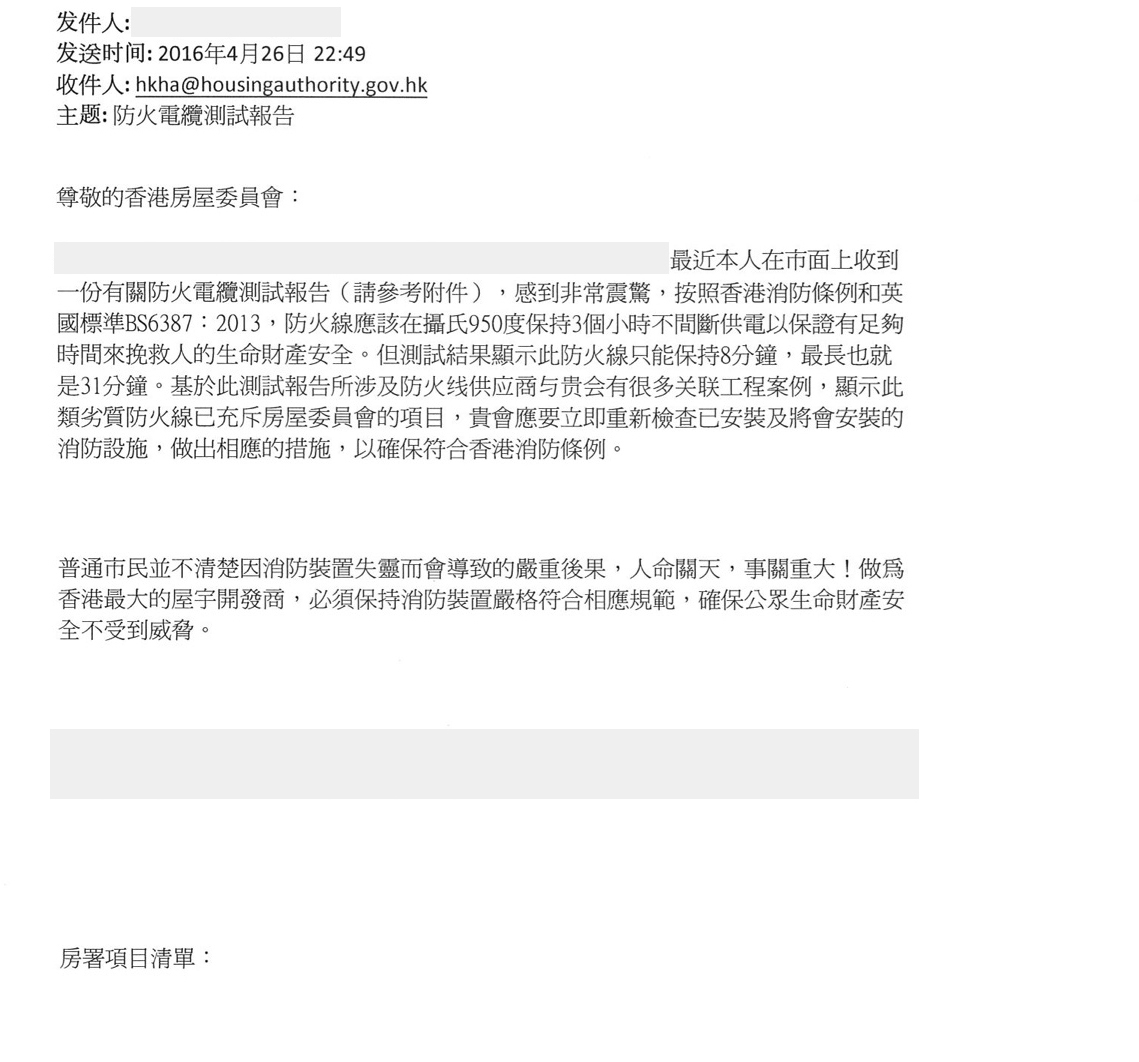
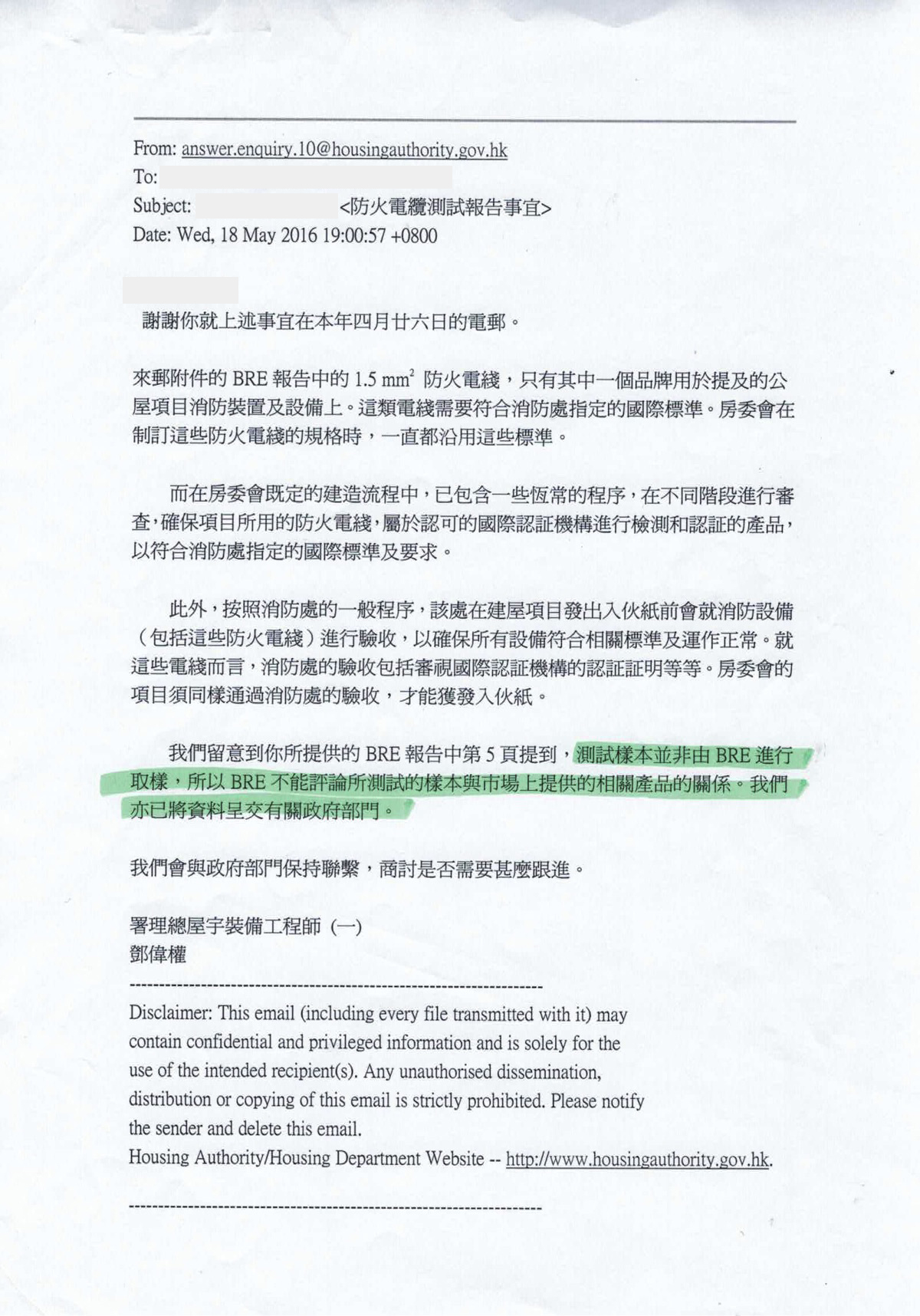
A building service employee who wished to remain anonymous provided FactWire with complaint emails made by anonymous parties from the industry to the Housing Authority (HA) as well as the response from the HA. The emails were sent on April 26 last year, with a fire-resistant cable test report attached, which was the same as the report attached with the complaint letters to the FSD.
The emails mentioned at least nine public housing projects under the HA, stating that ‘since the suppliers involved in the report are connected with a lot of maintenance projects under the HA, it shows that the unqualified cables are widely used in projects under the HA. The HA should immediately recheck the fire service installations that were or to be installed, and carry out relevant measures to make sure the cables fulfil the Hong Kong fire services regulations.’
The Acting Chief Building Services Engineer of HA issued a reply on May 18 stating that among the cables mentioned in the test report, ‘only one of the brands mentioned were used in fire service installations of the mentioned public housing projects’ and that ‘this kind of cables have to meet the international standards regulated by the FSD.’
The reply also stated that ‘the rundown set by the HA included procedures for officials to conduct inspections at different stages to ensure that the cables used in the projects are products tested and approved by international certification bodies.
‘After the occupation permit of the project is issued, the FSD would conduct acceptance inspections on fire service installations (including these fire-resistant cables) to ensure that all facilities fulfil relevant standards and operate smoothly. The inspection for these cables include checking the certificates issued by international certification bodies, etc.’ The reply stated that the information was handed to relevant government departments to discuss whether follow-up action is needed.
Since last friday, FactWire made email enquiries to various government departments on their responses towards the cables failing to meet required standards, and what follow-up action or investigation they would carry out. Many departments replied stating that they would only cross-check the certificates.
The Housing Department (HD) replied that they are currently ‘carrying out investigations at different stages to ensure that the fire-resistant cables were already tested and approved by international certification bodies to fulfil the international standards regulated by the FSD.’
The Electrical and Mechanical Services Department (EMSD) and the Architectural Services Department (ArchSD) replied respectively that ‘the department has made verification arrangements for the relevant documents, including the relevant product certificates and test reports, to ensure that the fire-resistant cables meet the relevant requirements.’
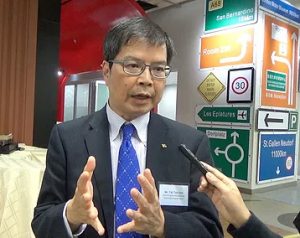
Acting Director of Electrical and Mechanical Services Tai Tak-him confirmed with FactWIre during an event on 25 April (Tuesday) that the government received complaints on fire-resistant cables failing to meet required standards, but did not collect samples for testing. ‘Usually we would not conduct testings, not only in Hong Kong but all around the world. Selling so many products, do we test everyone of them? And do we test products from different sellers as well? The cost would be very high for our society,’ said Tai.
Tai questioned FactWire’s sample collection method. ‘It is because the product is not designed for tests like this. You may damage the cable when you cut it out for testing. Even the simplest things, such as whether the insulator is unaffected, is hard to say. Actually no one ever did that.’
Tai added that the authorities would have taken action if the products were unsafe. However, the FSD is responsible for fire service systems while the EMSD is only responsible for providing assistance on construction-related matters to the FSD.
Since October last year, FactWire contacted multiple FSI contractors to learn about the problems regarding the quality of the fire-resistant cables. The contractors appeared to be cautious and declined interviews, saying that ‘they do not know much about the current situation of the manufacture of such cables’ and ‘would not comment on individual brands’.
A contractor which wished to remain anonymous admitted to FactWire that the industry knew about the complaints. However, ‘since the authority does not care, we could not distinguish between products of good or bad quality. As long as we contractors buy certified cables according to the regulations, we fulfil requirements of the FSD,’ the contractor said.

Lam Chun-man, former Director of Fire Services of the Hong Kong Fire Services Department and spokesperson of the fire services sector of the Hong Kong Institution of Engineers, declined to comment on whether the FSD handled the matter properly. He however emphasised that ‘the industry should reflect the problems to the authority if they discovered such. If it is just like the incidents of excessive lead content in drinking water, the FSD should use appropriate methods to acquire samples and conduct tests.’
When asked about whether it is reasonable for the FSD not to follow-up on the complaints, Lam said ‘if companies (contractors or suppliers) are found to have problems in their products for more than once, the authority should conduct testings on the products. However, the FSD can only use the least amount of resources and make the most results out of it, and there are so many fire service products in the market… Of course it is best to inform the industry and do more follow-up work.’
A registered electrical worker confirmed with FactWire that there are loopholes in the existing acceptance inspection regulations of fire-resistant cables, which cannot filter below-standards cables away from the market.
The electrical worker told FactWire that ‘the situation is just like another version of the incidents of excessive lead in drinking water- the product certification is the ultimate proof. For fire-resistant cables manufactured in large quantity and supplied in bulk, the manufacturer can get the product certification as long as they send the products of best quality for inspection, and then gain approval from the FSD and other departments. For the rest of the products, even though their quality may not be as ideal, it is hard for outsiders to found out. If there really are heartless businessmen selling bad-quality products with certification, the certification bodies, quality control authorities, contractors and users cannot prevent it from happening or avoid it.’
According to the current acceptance inspection procedures, the government departments only have to verify the documents and product certificates instead of collecting samples for testing. In the replies to FactWire, the ArchSD stated that under contract arrangements, the materials used in the building project would be supplied and installed by the contractor of the project. The project engineer would then require the contractor to provide certification documents such as test reports or certificates, so as to ensure that the suggested materials meet the requirements regulated by the department as stipulated in the contract.
When the materials arrive the construction site, the ArchSD site supervisor would cross-check relevant information, including the brand, model, certification documents and labels of the materials, to ensure they meet the standards.
Fire-resistant cables in general have to meet the standards regulated by the ArchSD as stated in the ‘General Specification for Electrical Installation’, ‘General Specification for Fire Service Installation’, as well as the ‘Codes of Practice for Minimum Fire Service Installations and Equipment and Inspection, Testing and Maintenance of Installations and Equipment’ regulated by the FSD. When evaluating the quality of the fire-resistant cables, the contractor has to provide evaluation documents of the cables issued by the FSD or documents of approval issued by certification bodies, showing that the cables meet the required standards.
According to a FSI contractor, although the FSD would earnestly carry out tests on the fire service installations, it puts focus on aspects of more importance, such as tests on whether the alarm system or water supply system is running smoothly, whether water is running normally, and checking materials installed in public spaces, such as metal pipes, fire-proof boards, etc.
The FSD would not carry out ‘destructive tests’ in general, so it is difficult to check whether the fire service installations are supplying electricity and operating smoothly in case of fire accidents, the FSI contractor added. Contractors would only cross check whether the brand and model number matches with that stated on the material list for installations such as fire-resistant cables.

According to documents about fire service installations and product certification issued by the FSD in 2007 and 2014, fire-resistant cables belong to the ‘Fire Service Installations and Equipment and other products requiring FSD’s Prior Approval/Acceptance’ category, and this type of product has to be tested by product certification bodies to prove that it meets the required standards and can be put into the list made available to the public and watchdog organizations.
An application can also be made to the FSD regarding this type of product for the FSD Licensing and Certification Command and investigative team to conduct evaluation. The application should be attached with information such as test reports issued by certification bodies, certificates and product catalogs.
According to the ‘List of accepted materials and equipment (Ventilating system)’ issued by the FSD, the Keystone FR7211 cable (cross-sectional area ranging from 1.5 to 35 square millimetres), was approved by the FSD in July 2013 and recognized as a type of fire service facilities and materials. A reinspection of the product would not be carried out until July 2018.
Lam said there is little the FSD can do as a regulatory department under the present system which relies on product certification, that the situation of suppliers and contractors circulating bad-quality cables in the market can only be combated by market forces.
Lam pointed out that since maintenance consultants or authorized persons may not possess professional knowledge on fire services, they could only delegate the work of ensuring the installations meet the required standards to FSI contractors. However, as registered fire service engineers are lacking under the current system, no professionals have to be criminally liable or risk losing their qualifications for violating the rules. FSI contractors can even evade responsibility by ending their businesses or deals.
The Fire Services (Amendment) Bill 2016 was passed in Legislative Council on March 1 this year. Lam urged the government to hasten the implementations of relevant subsidiary legislation and settle plans and regulatory laws for registered fire service engineers, so that qualified professionals can strengthen performances on their gate-keeping duties to check whether the fire service installations fulfil the required fire services safety standards.

